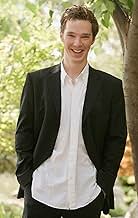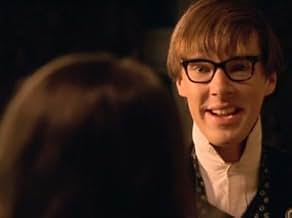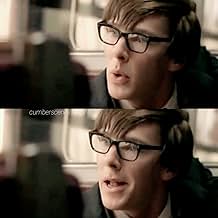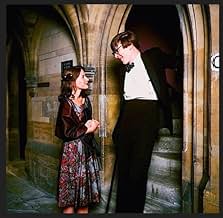IMDb-BEWERTUNG
7,4/10
6528
IHRE BEWERTUNG
Füge eine Handlung in deiner Sprache hinzuTheoretical physicist/cosmologist Stephen Hawking's life and search for the beginning of time (1963-6).Theoretical physicist/cosmologist Stephen Hawking's life and search for the beginning of time (1963-6).Theoretical physicist/cosmologist Stephen Hawking's life and search for the beginning of time (1963-6).
- Nominiert für 2 BAFTA Awards
- 1 Gewinn & 3 Nominierungen insgesamt
Christian Rubeck
- Reporter
- (as Christian Pedersen)
Empfohlene Bewertungen
'Hawking', which I saw recently on BBC2, is a fictionalised telefilm biography of physicist Stephen Hawking ... known to Homer Simpson as 'that wheelchair guy'. (Hawking is also the only person ever to make a guest appearance *as himself* in an episode of 'Star Trek: The Next Generation'.) Some modern-day public figures are so well-known -- in vocal patterns and physical appearance -- that any actor's attempt to portray them on screen must be to some extent a physical impersonation. A depiction of Hawking presents unusual opportunities and challenges. Firstly, audiences have no idea what Hawking's speaking voice sounded like, as he did not become a public figure until the progressive degenerative disease which afflicts him (amyotrophic lateral sclerosis, or ALS) had worsened to the point that he now 'speaks' with the aid of an electronically-generated voice that makes him sound like a Dalek. In the early scenes of 'Hawking', before Hawking acquires ALS, actor Benedict Cumberbatch (great name!) speaks in a cultured voice that is certainly appropriate to the character he plays on screen, if not the actual Hawking.
More problematic is the physical portrayal, as we're aware that an 'able' actor is portraying a disabled person: if Cumberbatch's rendition of Hawking's symptoms is accurate, inevitably some audience members will accuse him of overacting. This is a no-win situation, which would have daunted any non-disabled actor in such a role.
Cumberbatch is appealing and charismatic (more so than the real Hawking) in the early sequences, leading up to when Hawking first experiences tremors at age 21. There's an awkward scene in a jazz club, that could have degenerated into self-parody. We see Hawking, physically challenged but not yet incapacitated, watching enviously while others dance. Awkwardly, he rises and attempts to join in. (By all accounts, Hawking was socially uncoordinated long before he was physically so.) Cumberbatch gives as much dignity as possible to a portrayal which we recognise as that of a graceful actor depicting a man who has both social and neurological disabilities.
The portrayals of some of the other real-life figures are not very well-thought. I knew Sir Fred Hoyle, and the actor who portrays him here is neither especially accurate nor especially credible in his portrayal ... except for the scene re-enacting the famous incident when Hawking denounced Hoyle's latest theory in the auditorium of the Royal Society. Roger Penrose, the developer of tile theory, is played here as an absent-minded boffin who witters away at the public bar without remembering that he'd meant to order a pint.
The most ludicrous scene (a fictitious incident?) occurs when Hawking is in a railway compartment with a woman who can talk the hind leg off a donkey, prompting Hawking to suddenly imagine Time reversing itself. This scene appears to be inspired by a sequence in 'A Beautiful Mind', but that film depicted scientific inspiration much more cleverly than is done here.
Cumberbatch is quite good in the early scenes, yet he gets even better in the later scenes as Hawking's ALS takes its toll on his body. Inevitably, Cumberbatch's role gravitates into Lon Chaney territory, yet his portrayal is so deft that it never quite tips over into histrionics. The period detail and production design are impeccable throughout.
SLIGHT SPOILER NOW. There is an awkward framing device, reminiscent of several Tom Stoppard plays or Michael Frayn's 'Copenhagen', yet less effective than either. We see two Nobel laureates giving a TV interview, discussing a noise they've discovered, which turns out to be the background microwave radiation that fills the universe ... the leftover sound of the Big Bang. (Fred Hoyle invented that term, but intended it derisively: he rejected the Big Bang theory which is now widely accepted.)
I'll rate 'Hawking' 8 out of 10, as a flawed but excellent attempt to depict a difficult biographical subject who is involved in a field that audiences don't readily comprehend. ALS, the disease that crippled Stephen Hawking, is known in America as Lou Gehrig's disease, in honour(?) of the baseball player whose brilliant career and promising life were ended by it. Lou Gehrig's story was told brilliantly in 'Pride of the Yankees', but that great film remained very shadowy and nebulous about the terrible disease at the centre of its story. 'Hawking' does not pull such punches, and I recommend this excellent bio-pic.
More problematic is the physical portrayal, as we're aware that an 'able' actor is portraying a disabled person: if Cumberbatch's rendition of Hawking's symptoms is accurate, inevitably some audience members will accuse him of overacting. This is a no-win situation, which would have daunted any non-disabled actor in such a role.
Cumberbatch is appealing and charismatic (more so than the real Hawking) in the early sequences, leading up to when Hawking first experiences tremors at age 21. There's an awkward scene in a jazz club, that could have degenerated into self-parody. We see Hawking, physically challenged but not yet incapacitated, watching enviously while others dance. Awkwardly, he rises and attempts to join in. (By all accounts, Hawking was socially uncoordinated long before he was physically so.) Cumberbatch gives as much dignity as possible to a portrayal which we recognise as that of a graceful actor depicting a man who has both social and neurological disabilities.
The portrayals of some of the other real-life figures are not very well-thought. I knew Sir Fred Hoyle, and the actor who portrays him here is neither especially accurate nor especially credible in his portrayal ... except for the scene re-enacting the famous incident when Hawking denounced Hoyle's latest theory in the auditorium of the Royal Society. Roger Penrose, the developer of tile theory, is played here as an absent-minded boffin who witters away at the public bar without remembering that he'd meant to order a pint.
The most ludicrous scene (a fictitious incident?) occurs when Hawking is in a railway compartment with a woman who can talk the hind leg off a donkey, prompting Hawking to suddenly imagine Time reversing itself. This scene appears to be inspired by a sequence in 'A Beautiful Mind', but that film depicted scientific inspiration much more cleverly than is done here.
Cumberbatch is quite good in the early scenes, yet he gets even better in the later scenes as Hawking's ALS takes its toll on his body. Inevitably, Cumberbatch's role gravitates into Lon Chaney territory, yet his portrayal is so deft that it never quite tips over into histrionics. The period detail and production design are impeccable throughout.
SLIGHT SPOILER NOW. There is an awkward framing device, reminiscent of several Tom Stoppard plays or Michael Frayn's 'Copenhagen', yet less effective than either. We see two Nobel laureates giving a TV interview, discussing a noise they've discovered, which turns out to be the background microwave radiation that fills the universe ... the leftover sound of the Big Bang. (Fred Hoyle invented that term, but intended it derisively: he rejected the Big Bang theory which is now widely accepted.)
I'll rate 'Hawking' 8 out of 10, as a flawed but excellent attempt to depict a difficult biographical subject who is involved in a field that audiences don't readily comprehend. ALS, the disease that crippled Stephen Hawking, is known in America as Lou Gehrig's disease, in honour(?) of the baseball player whose brilliant career and promising life were ended by it. Lou Gehrig's story was told brilliantly in 'Pride of the Yankees', but that great film remained very shadowy and nebulous about the terrible disease at the centre of its story. 'Hawking' does not pull such punches, and I recommend this excellent bio-pic.
The story of young Stephen Hawking's doctorate - starting with his 21st birthday in 1963, shortly after which he was diagnosed with motor neuron disease. The story continues with Hawking going to Cambridge to gain his doctorate, during which he fights to come to terms with his illness, grows ever-closer to young student Jane Wilde, and has to figure out something to write his thesis on... ...All this is told in flashback by Nobel Prize winners Bob Wilson and Arno Penzias (Tom Hodgkins and the marvellously irascible Michael Brandon, respectively), talking in 1978 about their discovery - the "3 degree hiss" of microwaves that is the echo of the Big Bang, which is the proof of Hawking's remarkable and evolutionary theory that he formulated for his doctorate thesis. Hawking didn't come up with the idea of the Big Bang, but he did show mathematically that the prevalent theory of the time - "Steady State", in which the universe was thought to be unchanging and to have existed forever - was wrong.
The performances are uniformly excellent, with Benedict Cumberbatch in the lead role making for a very convincing Hawking, capturing his brilliance and vulnerability well and portraying his physical deterioration sympathetically and convincingly. Other standout performances include Tom Ward as Roger Penrose, giving a superbly confident and energetic portrayal of the young professor who was Hawking's friend and mentor; John Sessions as Dennis Sciama, quiet and intense as Hawking's supervisor; Peter Firth as a triumphantly and permanently bad-tempered Fred Hoyle, with whom Hawking locked horns over their contradictory theories on the origin of the universe; and Lisa Dillon as Jane Wilde, who gave Hawking the strength to overcome his illness and realise his ideas.
Is this a sanitised or oversimplified story? Undoubtedly, but these things always are. That doesn't matter; the main characters are engaging, and the science is extremely well-handled. Hawking's "eureka" moment, when he literally falls off a train and desperately explains his idea to Penrose by drawing with chalk on the station platform, is powerful and moving and believable in equal measure. This drama shows that it's not just the great artists, the painters and composers and musicians, who have led remarkable and fascinating lives - science, in its own way, has just as much power to move and intrigue, and scientists have just as many great stories to tell.
The performances are uniformly excellent, with Benedict Cumberbatch in the lead role making for a very convincing Hawking, capturing his brilliance and vulnerability well and portraying his physical deterioration sympathetically and convincingly. Other standout performances include Tom Ward as Roger Penrose, giving a superbly confident and energetic portrayal of the young professor who was Hawking's friend and mentor; John Sessions as Dennis Sciama, quiet and intense as Hawking's supervisor; Peter Firth as a triumphantly and permanently bad-tempered Fred Hoyle, with whom Hawking locked horns over their contradictory theories on the origin of the universe; and Lisa Dillon as Jane Wilde, who gave Hawking the strength to overcome his illness and realise his ideas.
Is this a sanitised or oversimplified story? Undoubtedly, but these things always are. That doesn't matter; the main characters are engaging, and the science is extremely well-handled. Hawking's "eureka" moment, when he literally falls off a train and desperately explains his idea to Penrose by drawing with chalk on the station platform, is powerful and moving and believable in equal measure. This drama shows that it's not just the great artists, the painters and composers and musicians, who have led remarkable and fascinating lives - science, in its own way, has just as much power to move and intrigue, and scientists have just as many great stories to tell.
I didn't expect to enjoy this film. I did, and I'm still thinking about it. It was moving, emotional, sensitive and brilliantly crafted.
I know little about Stephen Hawking, and the subjects of physics and cosmology are completely over my head. I think it is a testament to the script and performances that this film made such subject matter appealing and engaging. Don't think the film is for science geeks - it is an uplifting story full of courage and hope and is thoroughly rewarding.
Benedict Cumberbatch is quite simply brilliant in this film. He is without doubt one of the finest actors in Britain.
I know little about Stephen Hawking, and the subjects of physics and cosmology are completely over my head. I think it is a testament to the script and performances that this film made such subject matter appealing and engaging. Don't think the film is for science geeks - it is an uplifting story full of courage and hope and is thoroughly rewarding.
Benedict Cumberbatch is quite simply brilliant in this film. He is without doubt one of the finest actors in Britain.
This has just shown on BBC2 here in the U.K this very night, and i'am still thinking about it five hour's later. the performances of the cast especially Benedict Cumberbatch as the young Stephen Hawking were superb. The sreenplay while somewhat fictionalized was to the point and highly emotive. The scienific plight of Hawking was simply and well told and the scenes of his horribly degenerating disease( M.N) are highly moving. My uncle died of this disease a year after being diagnosed, that Hawking has continued living with this disease for forty years is not only a testament to his will but also the passion he holds in his life and groundbreaking work. Superb! This should win awards around the world seriously and far, far better than the over praised A Beautiful Mind.Hawking truly was a beautiful mind.
In the 1960's, Stephen Hawking celebrates his 21st birthday at his parent's house before going out to his garden with a girl. As he lies looking up at the stars he realises he cannot move. After many tests, Stephen is diagnosed with motor neurone disease. Regardless he continues onto Cambridge to study physics. As his body starts to breakdown his mind shows no sign of stopping.
With the basic premise of mind prevailing over the failings of the body it is a surprise that no studio has had a crack at making a movie of the story prior to this (if they have I have not heard of it). I imagined that it would be turned into a cheap TVM for US daytime TV but happily the BBC got to it first. This film focuses on the Cambridge years of Hawking's life where he is diagnosed but fights on to formulate his theory of the big bang. This strand is very cleverly cut together with an interview with an interview (set in 1978) with Arno Penzias and Robert Wilson about their Nobel prize. The connection between the two wasn't known to me at the start but it does a very good job of showing the importance of both theirs and Hawking's work.
The interview section was very enjoyable simply because I didn't know where it was going and only a bit where the interviewer makes a big deal out of Penzias' German background for no reason struggles. The main thrust is a mixed bag but generally succeeds as it is an engaging human story even if you can't understand the science. Although the science is very simplified for the audience, what the film does do is translate the energy and excitement behind discovery and the mind. Not all of it works of course and there are some scenes that are distinctly weak. At the start the film states that some scenes are fictional and it is some of the weaker ones that are - I found it hard to accept the geeky Hawking chatting up a girl by talking physics to her; likewise some other scenes lack credence due to their setting and dialogue.
Cumberbatch does very well with his portrayal of Hawking considering he had no footage to work with and only was able to meet the man himself once before shooting once during it. He manages to look a little like Hawking and has got his smile down well (the smile that Hawking still has). His weak moments come when the dialogue gets a bit silly but he manages to convey the excitement of the big bang revelation as well remaining a likeable guy who's mental ability never alienated me. The support cast is mostly quite good, there is a minor straight role for John Sessions who does well, as do the guys who play Wilson and Penzias. Dillon's Jane is a bit weak and her fake tan leaves a white mark at her hairline that I found rather distracting (how shallow am I?!).
Overall this is an enjoyable little film despite it's weaknesses in the script and in the delivery at times. The basic human story is rather inspiring (even if few of us can rely on my mind to quite Hawking's degree) and the film manages to make the science rather exciting even if it fails to really explain it on much more than a childishly simplified level.
With the basic premise of mind prevailing over the failings of the body it is a surprise that no studio has had a crack at making a movie of the story prior to this (if they have I have not heard of it). I imagined that it would be turned into a cheap TVM for US daytime TV but happily the BBC got to it first. This film focuses on the Cambridge years of Hawking's life where he is diagnosed but fights on to formulate his theory of the big bang. This strand is very cleverly cut together with an interview with an interview (set in 1978) with Arno Penzias and Robert Wilson about their Nobel prize. The connection between the two wasn't known to me at the start but it does a very good job of showing the importance of both theirs and Hawking's work.
The interview section was very enjoyable simply because I didn't know where it was going and only a bit where the interviewer makes a big deal out of Penzias' German background for no reason struggles. The main thrust is a mixed bag but generally succeeds as it is an engaging human story even if you can't understand the science. Although the science is very simplified for the audience, what the film does do is translate the energy and excitement behind discovery and the mind. Not all of it works of course and there are some scenes that are distinctly weak. At the start the film states that some scenes are fictional and it is some of the weaker ones that are - I found it hard to accept the geeky Hawking chatting up a girl by talking physics to her; likewise some other scenes lack credence due to their setting and dialogue.
Cumberbatch does very well with his portrayal of Hawking considering he had no footage to work with and only was able to meet the man himself once before shooting once during it. He manages to look a little like Hawking and has got his smile down well (the smile that Hawking still has). His weak moments come when the dialogue gets a bit silly but he manages to convey the excitement of the big bang revelation as well remaining a likeable guy who's mental ability never alienated me. The support cast is mostly quite good, there is a minor straight role for John Sessions who does well, as do the guys who play Wilson and Penzias. Dillon's Jane is a bit weak and her fake tan leaves a white mark at her hairline that I found rather distracting (how shallow am I?!).
Overall this is an enjoyable little film despite it's weaknesses in the script and in the delivery at times. The basic human story is rather inspiring (even if few of us can rely on my mind to quite Hawking's degree) and the film manages to make the science rather exciting even if it fails to really explain it on much more than a childishly simplified level.
Wusstest du schon
- WissenswertesBenedict Cumberbatch is the first actor ever to play Stephen Hawking on screen in this film. He is also good friends with Eddie Redmayne, who played Hawking in the biopic Die Entdeckung der Unendlichkeit (2014).
- PatzerStephen Hawking, on his 21st Birthday, mentions the Beatles song "Please Please Me." This song was not released until the 11th January 1963, two days after Hawking's 21st Birthday.
- Zitate
Stephen Hawking: We are very very small. But we are profoundly capable of very very big things.
- VerbindungenFeatured in Hawking (2013)
Top-Auswahl
Melde dich zum Bewerten an und greife auf die Watchlist für personalisierte Empfehlungen zu.
Details
- Erscheinungsdatum
- Herkunftsland
- Offizieller Standort
- Sprache
- Auch bekannt als
- Hawking
- Drehorte
- Produktionsfirma
- Weitere beteiligte Unternehmen bei IMDbPro anzeigen
Zu dieser Seite beitragen
Bearbeitung vorschlagen oder fehlenden Inhalt hinzufügen
































